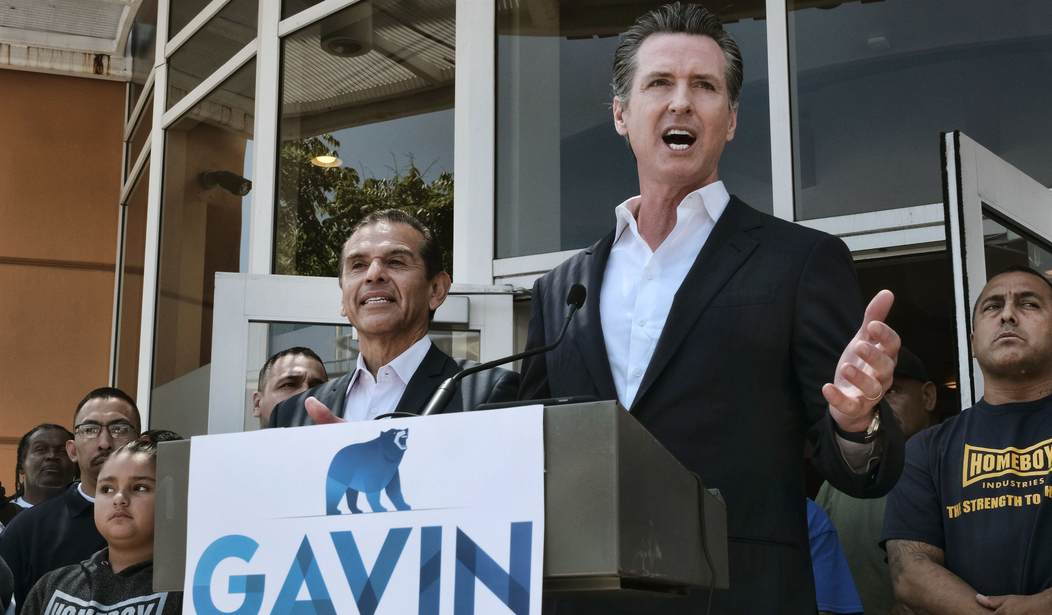In a critical moment, pensioners in the California Public Employees’ Retirement System wait to see if politicians want to throw away money after the bill that bans the use of private prisons in California was signed into law.
Last Friday, Governor Gavin Newsom signed Assembly Bill 32 banning state contracts with private prisons. That could easily reignite support for sister bill AB33 that makes CalPERS sell its stocks in private prison companies and leave consistent returns on the table to pursue social causes — again.
CalPERS has lost big for dumping stocks before, forcing executives to chase high-risk yields in other markets to offset its growing $145 billion hole in unfunded liabilities as investment returns stagnate. This year protests have targeted private prisons, making AB33 the latest front in the battle between activists who demand political divestments and pension managers who must uphold their fiduciary obligation to pensioners.
CalPERS’ divestments from “sin” industries like tobacco and gun manufacturing have lost the pension billions. In 2001, it sold its tobacco shares by board mandate, which have only grown in the years since. CalPERS now faces $3.5 billion in losses on that sale, and an additional $11 million loss in gun manufacturers, according to a March report administered by outside consultant Wilshire Consulting.
Yet, investors in charge of the pension know selling off stocks is unhelpful. CalPERS’ investment committee observed in the 2019 Total Fund Investment Policy, “divesting appears to almost invariably harm investment performance, such as by causing transaction costs and compromising investment strategies.”
Recommended
In the cases of tobacco and firearms, that’s exactly what happened. The board’s decisions cost California pensioners around $3.6 billion and continue to hurt pensioners as the funding gap widens after June’s investment returns missed the 7% target.
In the case of private prisons, these factors forced pension executives to oppose bill AB33. They argued private prisons represent a piece in a diverse portfolio that help hedge risk. Further, the investment committee said in March the estimated $175,000 the fund would pay in brokerage fees would require increased contributions.
The disagreement between the legislature and the board highlights the tension at the core of CalPERS’ investment strategy. The investment committee recognizes that divestments do more harm than good. Yet, a vocal minority of board members and representatives have never pushed harder to get rid of stocks that are increasingly politicized.
Protests against U.S. treatment of immigrants at the border and news stories about family separation in ICE detention centers dragged private prisons into the national spotlight next to industries like tobacco and guns. CoreCivic and GEO Group, the two biggest private prison companies in America, garnered the most attention, although neither company says it had anything to do with separating families.
Several major banks — JPMorgan Chase, Bank of America, SunTrust and Fifth Third Bancorp — and large public pensions — New York, New Jersey and some cities — have divested funding from the companies in response to protests. These divestments are part of a calculated strategy aimed to starve prison companies of capital and an attempt to artificially tank an industry that isn’t going away.
This comes at a time when pension funds around the world are struggling to meet return targets in numerous sectors—stocks, bonds, real estate, liquidity and more.
Since Ben Meng became chief investment officer of CalPERS in January, he has increased investment in private equity by $1 billion in an attempt to beat these trends. But that figure is hardly a dent in the projected $20 billion Meng plans to invest. Though the full plan is not yet public, it highlights the bind that divestments and low returns have created for the pension.
CEO of CalPERS Marcie Frost told newspaper Pensions & Investments that Meng approached the role with an emphasis on counteracting this trend by embracing risk, especially in private equity. Increasing investment in private equity could allow CalPERS to cover some of the unfunded liabilities it now faces, especially since it reported private equity outperformed the rest of its portfolio with 7.2% returns last year.
But it’s a big risk. If he’s wrong, the pension will fall even further behind on its long-term goal of becoming fully funded and will run out of money before it can pay back its pensioners.
Meanwhile, legislators and activists continue to put pressure on the pension to divest from stocks that have strategic value in its portfolio for reasons wholly outside of financial concerns. This limits the investment pool even further and forces managers to chase high-risk investments that could fall flat.
At the same time, potential profits from divested tobacco stocks continue to rise. If capital is so tight for the nation’s largest pension and the global financial landscape at large, the pension must reconsider performing stocks that the CalPERS of past mistakenly decided it shouldn’t hold.
Sound investments, not politics, must be the primary concern for the California pension. Activism on the board won’t curb a symbolic loss, it will exacerbate a real one.

























Join the conversation as a VIP Member